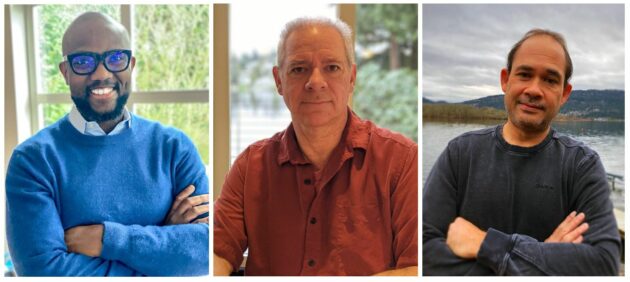
Femi Akinde and Mike Koss met a decade ago at StartPad, a former Seattle co-working space where Koss was director and Akinde was a startup founder. They both eventually moved on, but stayed in close contact. They had monthly lunches and started a social justice book club to discuss the Black experience.
But as the COVID-19 pandemic drove Black and Brown unemployment numbers disturbingly high and more companies pledged to increase their workplace diversity in the wake of Black Lives Matter protests, they decided that talk wasn’t enough. They needed to take action.
In July 2020, they began researching the ways in which existing tech bootcamps limited the diversity and numbers of participants. They wanted a new solution, but rather than build something from scratch, Akinde and Koss looked worldwide for a successful model.
Nigeria was churning out an unusually high number of tech companies landing spots in incubation startups, and in October, digital payments unicorn Stripe acquired Nigeria’s Paystack for more than $200 million. They discovered HNG Internship, a Nigerian program that has provided free coding training for about 25,000 students in Nigeria and other African countries over the past four years.
“They were offering zero hurdles to people getting the skills,” Akinde said. “There was no MIT, no Stanford. It was local kids getting skills. There were no massive buildings drawing them in, it was all being done online.”
Now Akinde, Koss and Tim Mallalieu are launching a tuition-free coding bootcamp called Reskill Americans that’s partnering with HNG Internship. It’s targeting racial and ethnic groups that are underrepresented in the tech sector (namely Black, Hispanic, American Indian and Pacific Islander enrollees). Entry into the program requires no interviews, hackathons, credit checks or prerequisite skills. Students need only a laptop and internet connection.
“We saw there was a gap in the market for an intervention program that was to be accessible to everyone,” Akinde said.
The effort is being bankrolled by the new bootcamp’s founders and advisory board members — all of whom are current or former Microsoft employees. Reskill American co-founders Akinde and Mallalieu currently work for Microsoft’s Azure Global. Koss, who is chief technology officer for Reskill Americans, was at Microsoft for 19 years, as well as working at Google and for startups.
The program is starting its inaugural class next month. Here are the details:
- Enrollment is capped at 1,000 students for the first class. About 250 have signed up so far.
- Students can sign up until March 7; classes begin March 15.
- The program runs for seven months: two months are spent on coding basics and selecting an area for specialization, two months are dedicated to working on a project, and three months are for a virtual internships.
- Students will spend about 12 hours a week on the course, with weekly assignments.
- The classes are taught online by Nigerian instructors through recorded and live sessions. The student to teacher ratio is about 10:1.
- Students will have access to U.S. mentors and local companies will provide motivational talks and presentations.
It costs the program about $2,500 to train each student. The team hopes to secure corporate sponsorship in the future.
There are numerous bootcamp and training courses locally and nationally that support diverse enrollees. In Seattle that includes the Apprenti program from the Washington Technology Industry Association (WTIA), Ada Developers Academy, Code Fellows, Galvanize, General Assembly, Skillspire and others.
The Reskill Americans founders say these other programs are more selective and optimize for graduation rates and placement in tech jobs.
“They do that by being very selective on the front end,” Koss said. “Our philosophy is different. We’re optimizing for access.”
The Reskill Americans program will be challenging and people will drop out. Even those who graduate might not land in technology jobs. But they’ll have some experience in coding, which could be useful in starting their own companies or in a variety of roles, the group said. The program will show a more diverse audience that technology skills and jobs are not exclusive, and are open to them.
“We are going out on a limb here,” said Koss, “and providing a pretty major opportunity for people.”



